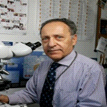 Dr. Mutagonda is a pharmacist and a lecturer for more than 7 years in the Department of Clinical Pharmacy and Pharmacology at Muhimbili University of Health and Allied Sciences (MUHAS), Tanzania. She holds a PhD in Clinical Pharmacology and a Master’s degree in Pharmacology and Therapeutics from MUHAS through the Swedish International Development Cooperation Agency funding. Mutagonda’s research interests include the determination of the effectiveness and safety of the drugs used in the prevention and treatment of infectious diseases particularly malaria and HIV. She has expertise on drug metabolism and plasma drug levels studies as well as clinical trial studies. She is a mentor and a research supervisor to postgraduate and undergraduate students and has co-authored several papers in peer-reviewed journals. She participated in investigating the pattern of utilization of malaria chemoprophylaxis in sickle cell disease (SCD) patients in Dar-es-salaam, Tanzania where we showed that majority of SCD patients do not use any antimalarial drug (Ndegeulaya EJ et al, Malar J., 2019). This work highlighted the need for a search for a suitable antimalarial that can be used by SCD patients for malaria chemoprophylaxis in Tanzania. She is currently working as Malaria Chemoprophylaxis Study Lead for Sickle Pan Africa Research Consortium (SPARCO)- Tanzania.
Dr. Mutagonda is a pharmacist and a lecturer for more than 7 years in the Department of Clinical Pharmacy and Pharmacology at Muhimbili University of Health and Allied Sciences (MUHAS), Tanzania. She holds a PhD in Clinical Pharmacology and a Master’s degree in Pharmacology and Therapeutics from MUHAS through the Swedish International Development Cooperation Agency funding. Mutagonda’s research interests include the determination of the effectiveness and safety of the drugs used in the prevention and treatment of infectious diseases particularly malaria and HIV. She has expertise on drug metabolism and plasma drug levels studies as well as clinical trial studies. She is a mentor and a research supervisor to postgraduate and undergraduate students and has co-authored several papers in peer-reviewed journals. She participated in investigating the pattern of utilization of malaria chemoprophylaxis in sickle cell disease (SCD) patients in Dar-es-salaam, Tanzania where we showed that majority of SCD patients do not use any antimalarial drug (Ndegeulaya EJ et al, Malar J., 2019). This work highlighted the need for a search for a suitable antimalarial that can be used by SCD patients for malaria chemoprophylaxis in Tanzania. She is currently working as Malaria Chemoprophylaxis Study Lead for Sickle Pan Africa Research Consortium (SPARCO)- Tanzania.
SPARCo Tanzania
 Having trained as haematologist in Italy and in the US (Columbia University), Lucio Luzzatto worked from 1964 to 1974 at the University of Ibadan, Nigeria; from 1974-1981 he was Director of the International Institute of Genetics and Biophysics, CNR, Napoli, Italy; in 1981 he succeeded Sir John Dacie as Professor of Haematology and Director of the Haematology Department at the Royal Postgraduate Medical School, Hammersmith Hospital, University of London, UK; in 1994 he became Professor and founding Chairman of the Department of Human Genetics at Memorial Sloan-Kettering Cancer Center in New York; from 2000 to 2004 he was Scientific Director of the National Institute for Cancer Research, Genova, Italy; from 2005 to 2015 Scientific Director of the Istituto Toscano Tumori, Firenze, Italy; currently he is Professor of Haematology at the Muhimbili University for Health and Allied Sciences (MUHAS) in Dar-es-Salaam, Tanzania. Lucio Luzzatto’s research has been focused on the genetic and molecular basis of blood disorders. Main contributions. (a) Glucose 6-phosphate dehydrogenase (G6PD): this was the first human enzyme of which molecular cloning was achieved with M G Persico in 1986. (b) Genetics of haemoglobinopathies and inherited susceptibility to malaria. In 2000 Luzzatto collaborated with M Sadelain to obtain correction of thalassaemia by gene therapy in a pre-clinical mouse model. (c) Pathogenesis, molecular basis and clinical aspects of paroxysmal nocturnal hemoglobinuria (PNH). Lucio Luzzatto and collaborators first proved this was a clonal disorder; subsequently his group identified the underlying biochemical abnormality, and with Bruno Rotoli and others provided the currently accepted model to explain the expansion of PNH clones. Lucio Luzzatto has about 400 publications in learned journals, and several chapters in major textbooks.
Having trained as haematologist in Italy and in the US (Columbia University), Lucio Luzzatto worked from 1964 to 1974 at the University of Ibadan, Nigeria; from 1974-1981 he was Director of the International Institute of Genetics and Biophysics, CNR, Napoli, Italy; in 1981 he succeeded Sir John Dacie as Professor of Haematology and Director of the Haematology Department at the Royal Postgraduate Medical School, Hammersmith Hospital, University of London, UK; in 1994 he became Professor and founding Chairman of the Department of Human Genetics at Memorial Sloan-Kettering Cancer Center in New York; from 2000 to 2004 he was Scientific Director of the National Institute for Cancer Research, Genova, Italy; from 2005 to 2015 Scientific Director of the Istituto Toscano Tumori, Firenze, Italy; currently he is Professor of Haematology at the Muhimbili University for Health and Allied Sciences (MUHAS) in Dar-es-Salaam, Tanzania. Lucio Luzzatto’s research has been focused on the genetic and molecular basis of blood disorders. Main contributions. (a) Glucose 6-phosphate dehydrogenase (G6PD): this was the first human enzyme of which molecular cloning was achieved with M G Persico in 1986. (b) Genetics of haemoglobinopathies and inherited susceptibility to malaria. In 2000 Luzzatto collaborated with M Sadelain to obtain correction of thalassaemia by gene therapy in a pre-clinical mouse model. (c) Pathogenesis, molecular basis and clinical aspects of paroxysmal nocturnal hemoglobinuria (PNH). Lucio Luzzatto and collaborators first proved this was a clonal disorder; subsequently his group identified the underlying biochemical abnormality, and with Bruno Rotoli and others provided the currently accepted model to explain the expansion of PNH clones. Lucio Luzzatto has about 400 publications in learned journals, and several chapters in major textbooks.
Pages
- « first
- ‹ previous
- 1
- 2
- 3

